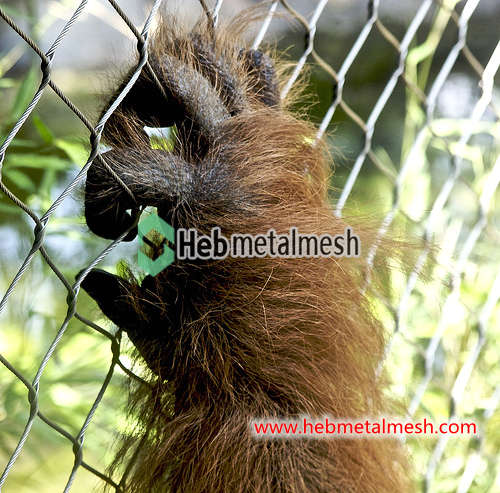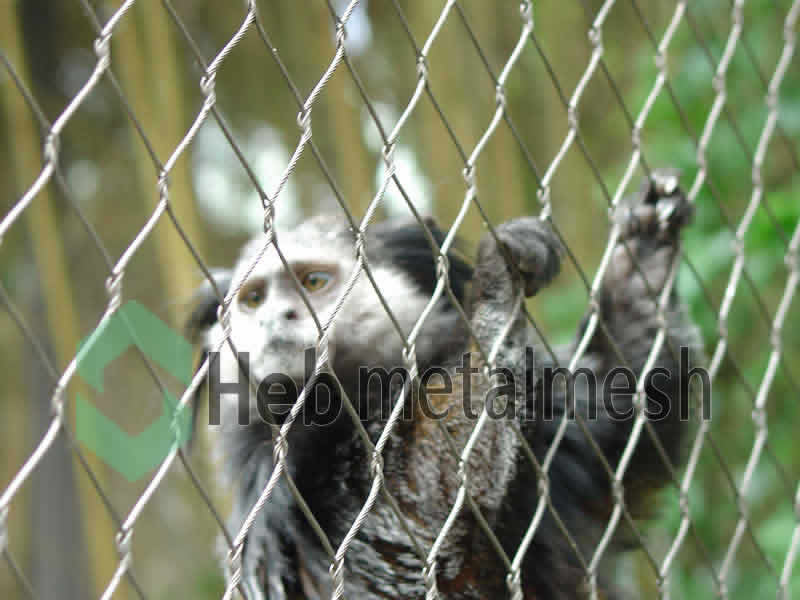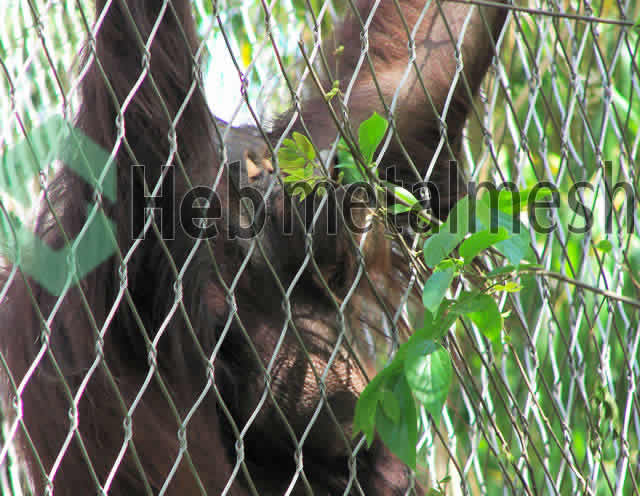Introduction to Mesh Enclosures
Mesh enclosures represent an essential advancement in animal care, providing a secure and comfortable habitat for various species. Unlike traditional cages made of solid materials, mesh enclosures offer a variety of benefits that significantly enhance the well-being of animals. The transparent nature of mesh allows for optimal visibility, ensuring that animals are not isolated from their surroundings while also allowing caretakers to easily monitor their health and behavior.
One of the primary advantages of mesh enclosures is the superior ventilation they provide. Proper air circulation is crucial for maintaining a healthy environment, particularly for species sensitive to temperature and humidity fluctuations. Traditional enclosures may retain heat and humidity, compromising the animals’ comfort. In contrast, mesh enclosures facilitate airflow, creating a more stable and enjoyable habitat. This is especially vital for small animals like rodents and birds, which are more susceptible to overheating in confined spaces.
Furthermore, mesh enclosures are versatile and adaptable for various animal types, ranging from small pets to larger exotic species. The use of durable materials ensures that these structures not only protect the animals from potential predators but also maintain their integrity over time. Mesh enclosures can be customized to suit specific needs, allowing for larger spaces, climbing options, or interaction areas, enhancing the quality of life for animals.
When comparing mesh enclosures to other types, such as glass or wooden alternatives, the flexibility and practical advantages of mesh become clear. While glass offers visibility, it lacks ventilation, which can lead to stagnant air and increased humidity. Wooden enclosures, on the other hand, can absorb odors and are prone to damage from moisture. Overall, mesh enclosures stand out as a preferred choice for pet owners and animal care professionals alike, ensuring safety, comfort, and an engaging environment for the animals.
Why Choose Wire Cable Mesh for Your Enclosure?
When it comes to designing and building enclosures for animals, the choice of materials plays a pivotal role in ensuring the safety and well-being of the animals housed within. Wire cable mesh stands out as a superior option due to its distinct advantages, including strength, durability, and flexibility. These properties make it an ideal choice for a wide range of applications, whether for residential pets or agricultural livestock.
One of the primary benefits of wire cable mesh is its exceptional strength. This material is engineered to withstand significant pressure and potential impacts, ensuring that it can resist the force exerted by larger animals. Its robust structure is designed to provide security against predators while simultaneously allowing for proper ventilation and visibility. This characteristic is particularly useful in environments where animals may be prone to stress, as observing their surroundings can offer a level of comfort.
Durability is another key advantage of wire cable mesh. Unlike other materials that may succumb to the elements over time, wire mesh displays impressive resilience against weather conditions, corrosion, and wear. This longevity translates to lower maintenance costs and a longer lifespan for the enclosure, ultimately saving owners time and resources. Moreover, the flexibility of wire cable mesh allows for adaptability in various enclosure designs, accommodating different animal sizes and types while ensuring safety.
Real-world applications of wire cable mesh can be observed across multiple settings, from backyard chicken coops to large-scale animal shelters. Farm operators frequently select this material for pasture fencing due to its ability to securely contain livestock while allowing them free movement and interaction with their environment. Pet owners often appreciate how wire mesh enclosures provide protection without sacrificing comfort, enabling pets to engage with their surroundings safely. Overall, wire cable mesh is an excellent choice for anyone seeking to enhance animal safety and well-being through effective and secure enclosure design.
Stainless Steel 304: The Best Material for Your Needs
When it comes to choosing the optimal material for constructing mesh enclosures, stainless steel 304 stands out as an excellent option. This specific grade of stainless steel is known for its remarkable corrosion resistance, making it suitable for a variety of applications, particularly in environments that may expose the enclosures to moisture or harsh weather conditions. Unlike other metals which may rust or degrade over time, stainless steel 304 maintains its integrity while offering a durable solution for both indoor and outdoor settings.
The longevity associated with stainless steel 304 is another factor that makes it a standout choice. Mesh enclosures made from this material are designed to endure the rigors of daily use without compromising their structural integrity. This durability can be particularly beneficial for animal enclosures, where safety and security are paramount. The strength of stainless steel 304 allows for designs that can withstand the pressures and behaviors of animals, providing peace of mind for pet owners and those in charge of animal care.
Maintenance is also simplified when using stainless steel 304 for mesh enclosures. The surface of this material is relatively easy to clean, requiring minimal effort to remove dirt or contaminants. Additionally, its resistance to tarnishing and staining means that frequent maintenance can be reduced, allowing owners to focus on the well-being of their animals rather than spending excessive time on upkeep. For those looking to invest in a long-term solution, stainless steel 304 proves to be both practical and efficient for creating reliable, secure, and aesthetically pleasing mesh enclosures.
Custom Sizes: Saving Time and Cost
When it comes to building mesh enclosures, one of the most significant considerations is the size of the materials used. Customizing roll sizes for mesh enclosures can lead to considerable savings, both in terms of time and expenditure. Traditional roll sizes may not always fit the specific dimensions and requirements of your project, leading to excess material usage and wasted resources. By opting for custom sizes, you can ensure that your enclosures are tailored to fit unique spaces without any unwanted surplus.
For instance, when designing a mesh enclosure for a specific area, choosing a roll size that perfectly matches your measurements means reduced cutting and adjustments. This streamlined approach saves valuable labor hours, allowing you to complete your project more swiftly. Moreover, fewer modifications result in fewer chances for errors, further enhancing the efficiency of the construction process. Cost savings associated with labor can add up significantly, making customized mesh an attractive option for budget-conscious builders.
Another key advantage of utilizing custom-sized mesh enclosures is the reduction of waste material. Often, standard roll sizes produce leftover mesh that cannot be effectively reused, leading to increased disposal costs and contributing to environmental waste. By customizing the size of your mesh, you not only optimize your investment in materials but also promote sustainability by minimizing unnecessary waste. This aspect can appeal to eco-conscious consumers and businesses aiming to adopt more responsible practices.
In essence, investing in custom sizes for mesh enclosures is a strategic choice for anyone looking to save both time and costs while ensuring their projects are executed efficiently. Tailored solutions not only meet specific needs but also enhance the overall experience of constructing functional and aesthetically pleasing enclosures.
Designing Your Mesh Enclosure: Key Considerations
When designing a mesh enclosure for animals, several key factors must be taken into account to ensure the safety, comfort, and well-being of the animals housed within. The primary consideration is the size and height of the enclosure. The dimensions should be appropriate for the species and number of animals it is intended to accommodate, allowing enough space for movement and interaction. For instance, small animals like rabbits may thrive in a more compact design, whereas larger species, such as dogs or goats, necessitate more spacious enclosures to promote healthy physical activity.
Another important aspect is the location of the mesh enclosure in relation to sunlight and weather patterns. Positioning the enclosure to receive adequate sunlight is essential, as animals require natural light for proper health and well-being. However, it is crucial to strike a balance; overexposure to direct sunlight can lead to overheating, especially in warmer climates. Therefore, incorporating shaded areas within the design can provide relief during hotter days, ensuring the environment remains comfortable. Additionally, consideration should be given to the potential impact of harsh weather conditions, such as rain or wind. Proper drainage and windbreaks can be integrated into the design to protect the animals from adverse weather.
It is also vital to think about the materials used in the construction of mesh enclosures. Selecting durable, weather-resistant materials can add to the longevity and functionality of the structure. Ventilation is a crucial element as well; a well-ventilated enclosure will reduce humidity levels and prevent the buildup of harmful gases, thus maintaining a healthy atmosphere for the animals. Lastly, consider the ease of access for feeding and maintenance. A thoughtfully designed enclosure should allow for simple cleaning and interaction, enhancing the caregiver’s ability to provide a safe, nurturing environment.
Indoor vs. Outdoor Enclosures: What’s the Difference?
When considering the design and construction of mesh enclosures, it’s essential to differentiate between indoor and outdoor settings, as both environments present unique challenges and benefits. Indoor mesh enclosures are often tailored for controlled environments, allowing for easy monitoring of conditions such as temperature, humidity, and ventilation. Within the confines of a home or indoor facility, these enclosures can also be designed to aesthetically align with existing décor, providing an attractive space for animals. They serve as a secure environment for pets or smaller animals, offering protection from potential household hazards while allowing for adequate visibility and interaction.
On the other hand, outdoor mesh enclosures must contend with a variety of environmental factors that indoor setups do not face. Exposure to the elements, including sunlight, rain, wind, and temperature fluctuations, necessitates the use of durable materials that can withstand these conditions. Safety is a crucial consideration in outdoor environments, as mesh enclosures have to protect animals from predators or escape while ensuring adequate airflow and sunlight exposure. The choice of materials should therefore prioritize both sturdiness and safety—essentially creating a barrier while promoting a healthy habitat.
From an aesthetic standpoint, outdoor mesh enclosures can be designed to blend with natural surroundings or serve as standalone features within a garden or yard. They can provide a more expansive space for larger animals, allowing for exercise and enrichment that might not be achievable indoors. Ultimately, the decision between indoor and outdoor mesh enclosures will depend on the specific needs of the animals, the environmental conditions, and the owner’s preferences. Each option has merits, and understanding these distinctions will assist in making an informed choice.
Common Myths About Mesh Enclosures Debunked
Mesh enclosures, often seen as the go-to solution for housing various animals, are frequently surrounded by misconceptions that can lead to hesitation in adopting them. Addressing these myths is essential for animal owners to make informed decisions about their pets’ safety and comfort. One prevalent myth asserts that mesh enclosures compromise the security of enclosures against predators. However, high-quality mesh materials, designed to withstand external pressures, provide substantial protection when installed correctly. The durability and strength of modern mesh fabrics often surpass traditional materials, ensuring that they can effectively keep animals safe from potential threats.
Another common misunderstanding is that mesh enclosures offer insufficient ventilation. In truth, one of the primary benefits of mesh enclosures is the ample airflow they provide. Properly designed structures maintain a balance between air circulation and shelter, allowing animals to remain comfortable regardless of external weather conditions. Unlike solid walls, mesh enclosures minimize the risk of overheating during warm months while offering adequate insulation during chilling temperatures, creating an ideal environment for various species.
Addressing Common Concerns: Animal Safety and Security
When considering the use of mesh enclosures for housing animals, concerns about safety and security are paramount for potential buyers. The integrity of the enclosure directly impacts the well-being of the animals contained within. Mesh enclosures are designed not only to provide visibility and ventilation but also to ensure the safety of the inhabitants against potential escape and external threats.
First and foremost, the material used in the construction of the mesh enclosure should be robust and durable. High-quality stainless steel or galvanized materials are recommended, as they offer resistance to wear and tear, thereby minimizing the risk of damage that could provide an escape route for animals. Mesh size is another critical factor; smaller openings can prevent smaller animals from squeezing through while still allowing for adequate airflow and visibility. A well-designed mesh enclosure can thwart escape attempts while maintaining a comfortable living environment.
Additionally, securing the mesh enclosures with suitable anchoring techniques can prevent any unauthorized access from predators and external animals. Burrowing animals, for example, may pose a security threat if the mesh is not buried to a sufficient depth. Implementing barriers or concrete foundations can further enhance the enclosure’s security, thereby providing a safe haven for the animals.
Furthermore, it is essential to address any worries about environmental factors, such as extreme weather conditions. Properly designed mesh enclosures can withstand adverse weather by incorporating strong frames and coverings that protect the animals from the elements while providing adequate ventilation. These factors together can significantly alleviate concerns about the safety and security of creatures housed within mesh enclosures, promoting peace of mind for owners and caretakers.
Conclusion: Your Next Steps in Building Your Mesh Enclosure
As we wrap up this comprehensive guide to designing and building mesh enclosures, it’s important to reflect on the crucial elements discussed throughout the article. The use of mesh enclosures offers numerous benefits, including improved ventilation, visibility, and safety for your animals. These enclosures not only provide a secure environment but also allow for interaction with nature while keeping unwanted elements at bay. Implementing the best practices in material selection, design considerations, and maintenance will lead to a successful project that enhances the living conditions of your pets.
Having acquired knowledge about the materials best suited for different animal types, as well as the structuring techniques to enhance durability and functionality, you are now well-equipped to embark on your own enclosure project. Consider the specific needs of your animals, such as their size, activity level, and behavioral traits, which will guide your design choices. Whether you envision a simple enclosure in your backyard or a more elaborate setup, maintaining an open line of communication with fellow enthusiasts and experts can provide valuable insights and support.
Take a moment to visualize your project—imagine the happiness of your animals frolicking within a secure, breathable mesh enclosure. The possibilities are boundless, and the journey to create a personalized haven for your pets is both exciting and fulfilling. With careful planning and a thoughtful approach, you can craft an environment that not only promotes their well-being but also enriches your living space. Now is the time to gather your materials and start designing; your animals will thank you for the comfort and safety you are about to provide them.


